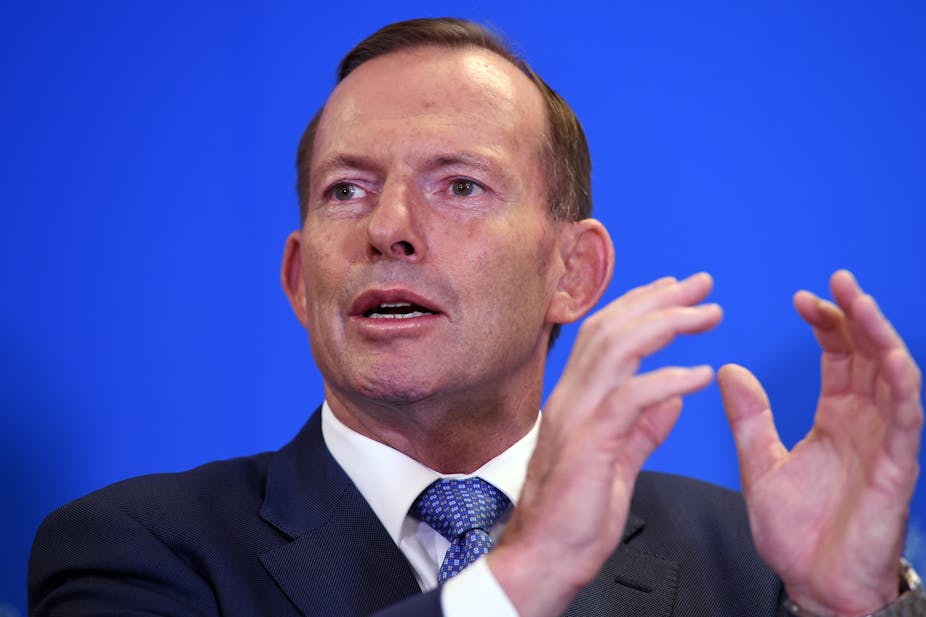The government on Monday will announce a new national counter-terrorism offensive to better meet threats, counter violent extremism and build community cohesion, as Tony Abbott shifts focus from individual rights to community protection.
The prime minister will foreshadow the appointment of a “counter-terrorism co-ordinator to bring the same drive, focus and results to our counter-terrorism efforts that worked so well to stop the boats”.
The present public alert system for terrorism warnings will be replaced with a simpler one, and in the budget the government will look at long-term funding issues for the counter-terrorism effort.
Abbott’s national security statement will also include already flagged moves to strip dual citizens associated with terrorism of their Australian citizenship, suspend the citizenship of those who have only Australian nationality, tighten visa and citizenship processes, and act against organisations such as the radical Islamist group Hizb ut-Tahrir.
The counter-terrorism strategy will be developed in co-operation with the states, and discussed at the Council of Australian Governments later this year. It will aim to more effectively co-ordinate efforts to deal with threats including from home grown lone actors and radicalisation in the community.
Abbott’s statement responds to both the report on the December Martin Place siege, released on Sunday, and the review of counter-terrorism machinery, set up last year.
The review concluded Australia has entered a long-term era of heightened threat from terrorism, with a much more significant home grown element.
In comments ahead of his statement, Abbott said the review had found the terrorist threat rising. It was worsening on all measures – the numbers of foreign fighters, known sympathisers, and extremists were all increasing.
“The number of potential terrorists, including many who live in our midst, is rising as well,” Abbott said. At least 90 Australians were fighting with and supporting terrorist groups in Iraq and Syria; more than 30 foreign fighters had returned to Australia, and at least 140 people in Australia were actively supporting extremist groups.
“Thousands of young and vulnerable people in the community are susceptible to radicalisation. Terrorists are becoming more adept at evading surveillance.”
The review also found it was becoming harder to combat terrorism. “Extremists’ slick online messages are grooming the socially isolated. Low tech terrorism, needing little more than a camera-phone, social media account and a knife, means that it is becoming harder for policy and security agencies to anticipate and disrupt attacks,” Abbott said.
The number of serious investigations continued to rise, with ASIO currently examining several thousand leads and persons of concern. About 400 were high priority cases, more than double the number a year ago.
The review supported the lifting of the national terrorist threat level on September 12 to high. This means an attack is considered likely. It is the second top level.
“Since then, we have witnessed the frenzied attack on two police officers in Melbourne and the horror of the Martin Place siege. Twenty people have been arrested and charged as a result of six counter terrorism operations conducted around Australia. That’s one-third of all terrorism-related arrests since 2001 – all within the space of six months,” Abbott said.
Abbott said the government would implement the review’s recommendations to strengthen the co-ordination of agencies, introduce initiatives to counter violent extremism manage the return of foreign fighters, and improve community understanding of the threat level.
In response to its recommendation for a clearer public alert system, Abbott said a replacement would be developed to provide more helpful information about what the threat is and what precautions might be taken.
In general, the review confirmed that Australia had strong and well co-ordinated counter terrorism arrangements and saw no reason for major structural changes. Abbott said the planned steps would significantly improve the nation’s counter terrorism efforts.
“We cannot promise that there will be no more attacks. In the current threat environment, our agencies assess that a terrorist attack remains likely. However this government will do everything it reasonably can to make Australians safe from terrorism.”
Releasing the report on the Sydney siege earlier, Abbott told a news conference there was an ongoing debate between individual rights and protection of the community. “My judgement is that – while having always to respect both – the question of precisely where we draw the line in an era of terrorism will have to be reconsidered and the line may have to be redrawn.”
Abbott said the report had found all the decisions made about gunman Man Haron Monis were reasonable enough at the time “but plainly, in their totality, the system has let us down.
"This guy shouldn’t have been in the country, he shouldn’t have been out on bail, he shouldn’t have had a gun, and he shouldn’t have been radicalised to the extent that he claimed to be conducting an Islamist death cult attack here in Australia.”
The report said that 18 complaints had been received in December, the month of the siege, about Monis’ Facebook page. They were assessed by ASIO and police but the posts were not considered to indicate an imminent threat.
The government has accepted the report’s recommendations, which will be reflected in Abbott’s speech.

